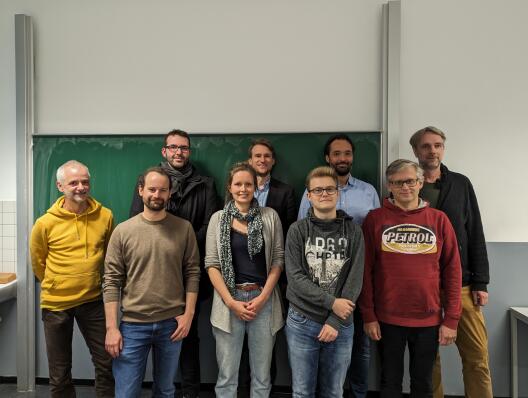

In summer semester 2025, the working group 'AI and Philosophy' and the Zentrum für Wissenschaftstheorie launch the ‘AI and Philosophy’ discussion forums.
Is what we call artificial intelligence really intelligent? Does the digital afterlife harbour social and ethical risks - and if so, what are they? Does generative AI jeopardise the work of artists? And how is the use of AI in research changing our understanding of science?
In the ‘AI and Philosophy’ discussion forums, we address fundamental, current and controversial questions related to AI - with a philosophical perspective. Each forum begins with an input phase that introduces the respective topic, followed by an open discussion in which different perspectives are welcome. No prior knowledge is required, curiosity is enough. Anyone who would like to join in the discussion is invited!
The discussion forums will be held in German, but contributions in English are also welcome. It is possible to take part in individual sessions only. Registration is not required.
Program
Social and ethical implications of the digital afterlife
In this session we will look at AI-generated digital avatars in the so-called digital afterlife. Two questions will be addressed: 1) What are the social and ethical challenges of encounters between living, surviving persons and virtual persons in the digital afterlife? 2) What does a posthumous, interactive appearance of a person mean for dealing with death and mourning?
Organization: Carsten Ohlrogge, M.A.
AI and / as art
728,784 US dollars. This is how much the first auction at Christie's New York in February 2025, which exclusively offered AI-generated works (a narrow category of fine art), fetched. Almost 6,500 people had previously signed a petition against the auction. The reasons included fear of theft of works by human artists, the devaluation of art or even the threat to the existence of human artists. Can machine tools “steal” from us humans? “Forging” like an art forger?
In 2020, a team from musicology and IT used an AI to complete Beethoven's “Unfinished” (the 10th Symphony) - the audience's reaction was overwhelmingly very positive. These two examples show that AI-generated “art” triggers fear reflexes and enthusiasm.
In any case, it raises new questions - or not so new? The questions about the originality of a work, its uniqueness and authenticity, its sources and authorship are old, but seem to be more concentrated around AI-generated works. And what about evaluation criteria such as style and quality? Particular emphasis is placed on two questions: the role of the artist and our fundamental understanding of art - is it an “artistic” and creative process when an AI composes, a robot “paints” a picture or the composition of a work is created from prompts, machine remixes and ‘coincidences’ in a “collaborative” act between man and machine?
According to Immanuel Kant, the prerequisites for creating art lie in consciousness, intention and freedom. Such a relationship to the world seems fundamentally impossible in AI-generated art. So is AI-generated art “just hype” or do we need a new concept of art? In this event, we would like to approach these questions in an open discussion using concrete examples of AI-generated works.
Gestaltung: Dr. Anna Lammers
Artificial & Natural Intelligence
In the debate about artificial and natural intelligence, a deflationary image of natural intelligence is often contrasted with an inflationary image of artificial intelligence. However, a closer look reveals a number of questions that remain unanswered in this comparison. A selection of such questions will be presented and then put up for discussion.
Organization: Dr. Martin Korth
Science in transition: How is the use of AI in research changing our understanding of science?
Artificial intelligence and machine learning methods have become an integral part of the methodological inventory in many disciplines. But to what extent is their use changing our often theory-based and explanatory understanding of science? At the beginning of the session, a classification by the philosopher of science Jan C. Schmidt will be presented, which will serve as a framework and stimulus for the following discussion.
Organization: Dr. Katrin Schmietendorf
All meetings will take place from 16.00 (s.t.!) to 17.30 in presence in SR 303 at the Institute of Theoretical Physics. (Nuclear physics main building: https://www.uni-muenster.de/uv/uniaz/lageplan/de/1511.)
About us
The interdisciplinary working group ‘AI and Philosophy’ emerged from the InterKI project. Since the winter semester 22/23, we have been meeting regularly during lecture periods to discuss the various philosophical aspects of artificial intelligence.
Philosophical prior knowledge or even a relevant academic education is not a prerequisite! Rather, the aim of the working group is to provide a forum for interdisciplinary dialogue on philosophical issues of AI. All you need to bring is an interest in philosophical discussion and a willingness to attend our meetings regularly. Everyone is welcome, from undergraduates to emeritus professors!
The working group is organized by Dr Martin Korth and Dr Katrin Schmietendorf.
Important for students: We are a voluntary working group, which unfortunately means that no credit points can be awarded.


